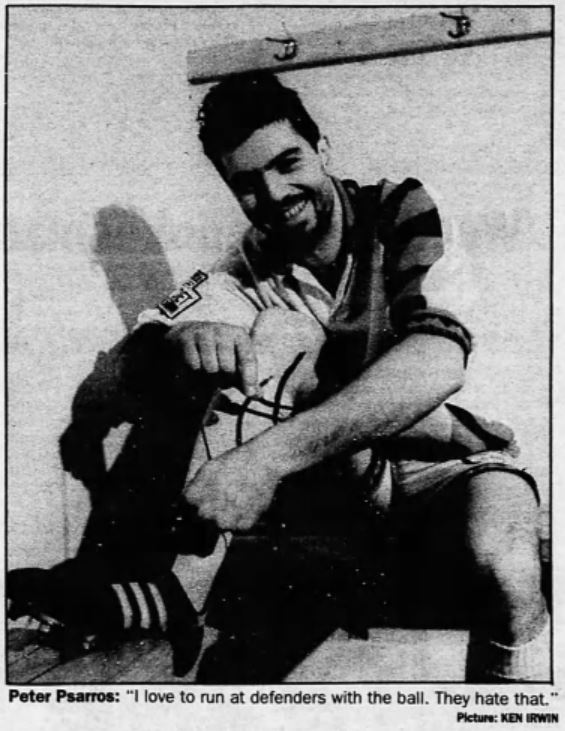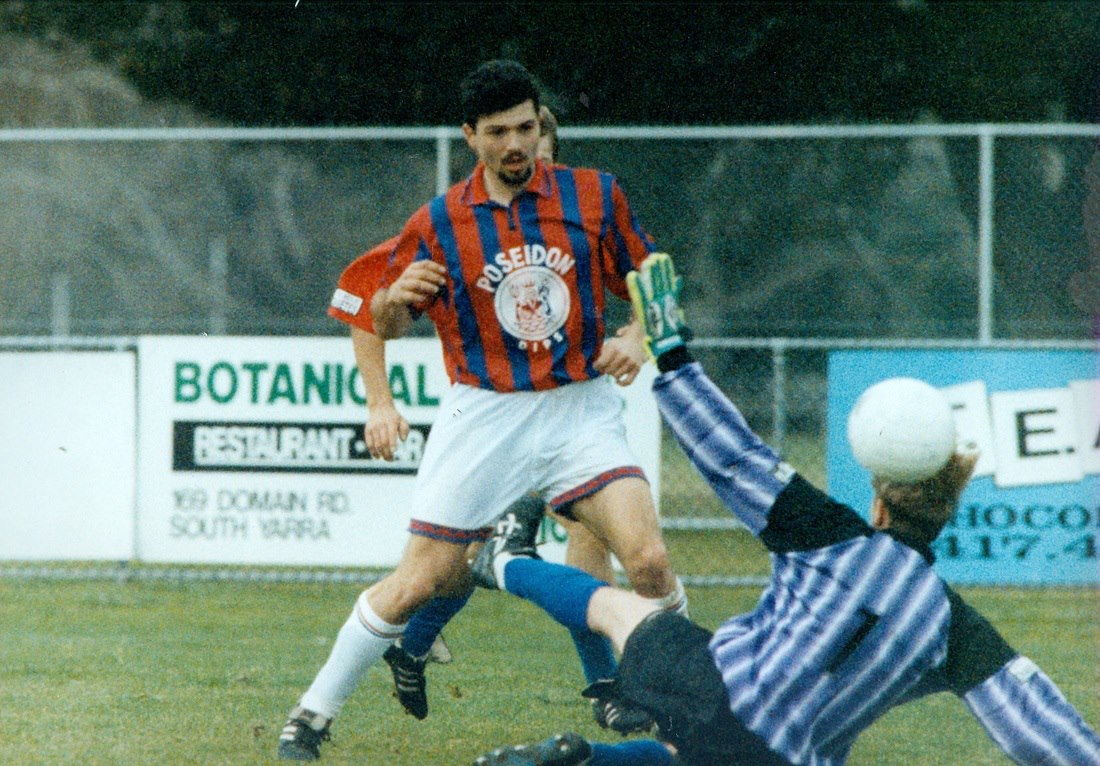Peter Psarros is as much a sharpshooter on the sidelines with a camera in his hands as he was on the pitch with a ball at his feet.
These days he’s widely recognised as the face of Smile for Peter photography, but Peter’s standing in the game extends to being a two-time VPL Golden Boot and a Jimmy Rooney medal recipient with pedigree in the NSL.
He was no ordinary footballer, either. A promising VFL/AFL player, the first time he played a competitive soccer match at club level was after the age of 18, having turned down the opportunity to join Hawthorn in the VFL. An irreverent striker, he admits not possessing the skill of his teammates, nor having much knowledge of the defenders he was up against, but that didn’t stop him from being one of the state’s most prolific scorers in the 1990s and early 2000s.
“Everyone 25+ knows me as a soccer player, all the young kids know me as Smile for Peter. A lot of their coaches are former players I used to play with. They tell them, ‘You know what he used to do?’ and talk me up, probably a bit too much.”
Early days
In 1978, Robert DiPierdomenico lifted the premiership cup with Hawthorn. Peter Daicos made his VFL debut in 1979. Both were post-war European migrant trailblazers in an Anglo-dominated sport. A wide-eyed, 10-year-old Peter watched on, hoping to one day emulate their feats with the egg-shaped ball. Having arrived in Australia in 1971, Peter eventually took up footy with his brother and played it at school “because it was the normal thing to do”.
As a rover, Peter could either dance past his direct opponent or bulldoze through packs. But his talents proved to be a sticking point. Earmarked as a future VFL star, other sports were off limits, even though many of his friends played soccer. The round ball game was almost a taboo, confined mainly to the park using bins or monkey bars as goals.
In his last year of high school and losing interest in footy training, Peter was finally allowed to play in the soccer team. While not technically gifted, his athleticism and natural instinct translated into “a record number of goals” for the team.
Yet coaches were still adamant his future lay with footy. VFL scouts from Hawthorn knocked on his parents’ door with the news that Peter had been selected for the club’s U19 squad.
“I was a lazy bastard, I wasn’t interested,” he says.
Code hopping
Instead, after graduating school, he joined friends at State League Two club Clifton Hill SC. Beginning his club journey in 1989, Peter’s State Two stint culminated in a 1992 season which yielded 20 goals and a golden boot. It marked the beginning of a rapid rise, one that had scouts keeping an eye on the late bloomer.
Peter signed with State One outfit Port Melbourne in 1993 and helped the club to second spot and promotion to the VPL with 16 goals and another golden boot.
“They didn’t always come pretty,” Peter admits, “but they were effective. I’d score with a lot of speed and not much grace.”

The momentum didn’t stop there. In a remarkable debut VPL season, the forward raced to the golden boot with 23 goals to help Port take third place. It was all too easy. Embarking on a deep finals run, the club reached the grand final a season after being promoted. But Peter wouldn’t take part in the showpiece event due to a refereeing blunder in the semi-final.
Similar to an incident years later in the English Premier League when referee Andre Marriner sent off Kieran Gibbs instead of Arsenal teammate Alex-Oxlade Chamberlain, Leo Kyriakopoulos put in a foul for which the referee booked Peter, ruling him out of the grand final against Preston.
Forced to start an injured Terry Rizopoulos up front, Taki Svigos’s side went on to lose 3-1, midfielder Peter Tsolakis scoring Port’s solitary goal.
National stage
Nevertheless, the VPL golden boot was in high demand. Initially asked by Frank Arok to join South Melbourne Hellas, a few import signings scuppered that opportunity. His subsequent trial at Sydney Olympic was successful, but with partner and family still based in Melbourne, and his father suffering illnesses, Peter returned home. Heidelberg added to their stocks with his signature alongside Port teammate Tsolakis.
From kicking a round ball competitively for the first time in 1989 as an 18-year-old in State League Two, five years later Peter Psarros was the state’s top scorer and a fully capped national league player.
“I always thought that I could play at any level,” he admits. “I was always like that. I was always a confident type of person.”
Like with many clubs of that era, however, Peter’s time at Heidelberg was turbulent. In a frustrating spell for the striker he started just five senior games – behind Bobby Despotovski in the pecking order – but he did score twice.
“They wanted me to come down, I came down. Michael Urakalo signs me and then decides to play me in the youths. Top goalscorer from the premier league and he wasn’t using me,” Peter says.
Off-field issues for the club translated onto the pitch. In 1995, Heidelberg finished last and was removed from the NSL in line with David Hill’s recommendations to de-ethnicise the league.
Heading overseas
There were plans for Peter to head abroad to Asia, with soccer journalist Peter Desira helping initiate a deal in Malaysia. However, as his father was gravely ill, he stayed in Victoria and had a short stint at Box Hill, helping the club avoid VPL relegation. In 1996 Peter moved back to Port Melbourne, then in 1997 he joined Fawkner Blues.
With family life settling again following his father’s death, Peter’s overseas move finally came in 1998, heading to the motherland. He was to have an interview at Ethnikos Piraeus in the Alpha Etniki with the club’s coach, but the day before the meeting he was sacked. Peter then trialled at fellow top-tier outfit Ionikos, however with Irish international Craig Brewster leading the line, the club opted not to sign Peter. He ended up spending a season in the nation’s lower leagues.
“Greece was different. Not all the grounds had grass and training wasn’t the best. And, being a foreign player – even though I was Greek – did not make it easier, you never got the ball from other players when training as they were looking to keep their spot in the team. But it was only a short stint so it was a good experience.”
Peter returned to Fawkner in 1999 where he featured for a couple of seasons. There he played alongside the likes of Jeff Olver, Eric Vassiliadis, Ivan Duzel, Joe Biskic, Carlos Retre and Agim Sherifovski – a talented side that didn’t ultimately make a splash on the finals front.
“Sherifovski was the quickest guy down that wing. I shot the sheriff I’d always say.”
“Biskic was amazing at his age. Being from a footy background, I was never the most skilful. I could score goals – that was my job. I’d give the ball to him, he didn’t like the way I delivered it and he said in his accent, ‘Psarros, what are you trying to do, kill me?’ He’d say that a few times because I didn’t have the skill that he did.”
In his final season at Fawkner Peter scored 13 goals, including a couple of hat tricks, returning to the form that made waves at Port Melbourne.

So close yet so far
His former club took notice. Despite finishing second in 1999, Port struggled to maintain its momentum. Player-coach Peter Tsolakis was relieved of his managerial duties mid-season as Frank Arok took the reins from the sidelines. Port narrowly avoided relegation, finishing ninth in a 12-team league.
Harry Chalkitis was appointed as head coach for the 2001 campaign. Now 30 years old, Peter was the experienced campaigner the new gaffer needed. And the striker returned and hit the ground running.
Netting 17 times, Peter claimed the league’s golden boot for the second time – still the only player of Greek heritage to achieve a double in Victoria.
Unfortunately his best efforts still weren’t enough for Port to claim an elusive championship, going down on penalties after a 2-2 draw against Heidelberg in regulation time.
The contest looked done and dusted when George Georgiadis and Mile Medjedovic had the Bergers up 2-0 after an hour, but Peter pegged a goal back in the 73rd minute and then a Tsolakis cross was turned in by Cameron Brown for an own goal in the 81st.
The scores remained level in extra time. Bergers custodian Jim Kourtis proved to be Port’s nemesis on penalties, making two saves in the shootout to sink the Sharks.
Peter was awarded the Jimmy Rooney medal as best on ground. It was scant consolation for the losing grand finalist.
“The 2001 season was great, top bunch of blokes to play with but the job was not done in the last game of the year,” he laments.
Both clubs suffered a grand final hangover in 2002. Port finished eighth, Heidelberg dead last in 12th and relegated. Peter’s last season in the top flight was in 2003, playing for state league clubs thereafter. He retired in 2010 in his 40s, his CV also including being in Port Melbourne’s Team of the Century, along with time in the Victorian state side, one tour including a trip to China.
“State team was a laugh – 90 per cent of the team loved to have a smoke like me, and 100 per cent liked to have a drink and party, so it was always a good time. On the trip to China, up on the Great Wall, myself and Dragi Nastevski and Dean Fak were running late as usual, so instead of enjoying a nice walk down the wall we had to run it so we would not miss the bus.”
“Talking amongst the older guys, the game seems faster now but it’s not, back then we would have been stronger and more skilful because nowadays – same in the AFL – it’s about how lean and how much of an athlete you are, what times you can do. Back then it was tough football and it was skilful. You can’t say that now, though, because everyone thinks they’re in a better era”.
Life after football … in football
It was while his playing career was winding down at Southern Suburbs that Peter became interested in capturing moments rather than just creating them. Northcote City were the first club to acquire his services as a photographer.
His list of clients now extends to more than a handful. One of them is Oakleigh Cannons, where long-time Port Melbourne and Heidelberg teammate Tsolakis coaches. Both remain good friends to this day.
“He wants to go anywhere I go. He was also at Northcote coaching when I was taking snaps. We played in the Greek side in the mini World Cup together. He knows where the talent is,” Psarros laughs.
What sets Peter apart is his deep association with the Victorian game and his eye for documenting action off the pitch, snapping the footballing personalities – smiling or not – in attendance, and treating the game as much more than just football.
Now also settled with a wife and children, his association with the sport is still as strong as it ever was.
“I’ve got a beautiful wife Nicky who never missed a game, would come to trainings, but the grand final against Heidelberg killed her.
“My son plays Auskick and soccer. I don’t do anything with him – I’m not one of those parents. Last season he scored no goals, this season he scored about 20. He’s got more skill than me but he’s also a bulldozer like I was. There will be three players, he’ll go straight through them and he’ll run away with the ball.”
Injuries have prevented Peter from pulling on the boots in his mid-40s for the veterans’ side of the game, but maybe that’s good news for opponents who no longer have to put up with his antics on the pitch, although his presence endures on the sidelines with camera in hand.
“No regrets. I wasn’t a serious soccer player. I was out there to have fun, score goals, and enjoy it,” he says. “I would talk to my defenders, I always liked to have a chat. They tried to kick the shit out of me.
“If I did it again, I wouldn’t change a thing.”

